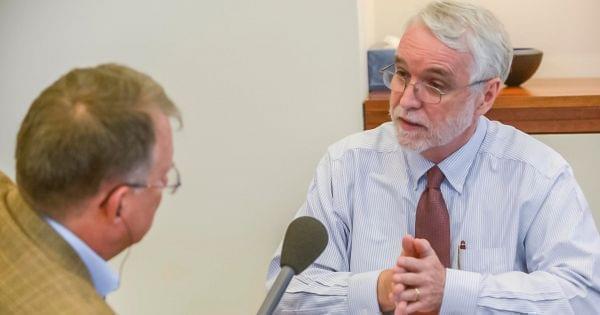U of I Pres. Killeen Talks About Email Disclosures, New Med School, State Budget & Strategic Vision

University of Illinois President Timothy Killeen is interviewed in his office by Illinois Public Media's Jim Meadows (Darrell Hoemann/Midwest Center for Investigative Reporting)
Three months into his new position as president of the University of Illinois, Timothy Killeen says the controversies facing the university haven’t slowed down work on a multi-year “strategic vision.” In the meantime, Killeen says the university is dealing with its immediate problems, from the departure of its Urbana campus chancellor to a gap in state funding due to the budget impasse in Springfield.
In an interview with Illinois Public Media’s Jim Meadows, Killeen says work on the strategic vision plan is going well, and he still expects it to be go before the university’s board of trustees in the spring of 2016.
And Killeen says the university is dealing with its immediate controversies, including the disclosure that it had failed to include emails sent from private accounts in recent Freedom of Information Act requests. Former Urbana campus Chancellor Phyllis Wise was among those who sent such emails in an apparent effort to shield them from FOIA requests, despite the university’s policy to the contrary. The university released the withheld emails one day after Wise announced her resignation as chancellor.
Killeen says that while “it’s OK” to conduct university business from private email accounts, “any such records have to be made available, subsequent to FOIA requests for the Freedom of Information law.”
Killeen says that once the problem was discovered, the university “went the extra mile” in correcting it, releasing the previously withheld emails to the public.
“And going forward,” said Killeen, “we’re going to clarify, make sure that everybody understands the need for all university business materials to be made available, when there’s a request through the Freedom of Information laws.”
Wise’s resignation as chancellor means the University of Illinois is losing one of the driving forces behind the creation of the new, Urbana-based Carle Illinois College of Medicine. But Killeen says development of the new engineering-focused medical will move forward, and is “not going to skip a beat”.
The new medical was approved by the U of I Board of Trustees earlier this year, despite opposition from administrators at the Chicago campus, home of the university’s existing medical school. Killeen says the existence of two different medical schools in the University of Illinois system shows the breadth of its capabilities in medicine, with approaches “stretching from community-engaged medicine, clinical translational research, all the way through to the highest of high-end technologies.”
Meanwhile, the University is coping with the lack of a budget at the state level -- which means the lack of state funding for higher education.
“There’s no immediate crisis for us, although the longer this goes on, the more troublesome it gets, obviously,” said Killeen of the budget impasse in Springfield.
Killeen says the university has taken steps to continue operating, even with the delay in state funding.
“We’ve made some serious decisions already,” Killeen said. Those include a freeze on new administrative hiring, and moving some funding earmarked for administration over to students and the classroom. Killeen says the U of I will also make use of tuition revenue that usually comes in this time of year, as well as some state funding delayed from the last budget year.
But Killeen says the University of Illinois will be facing serious problems if the budget impasse continues into the fourth quarter of 2015.
(Interview audio edited by Tiffany Jolley)

